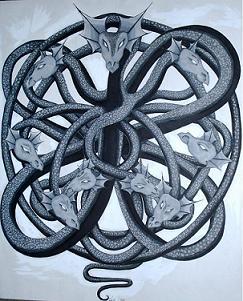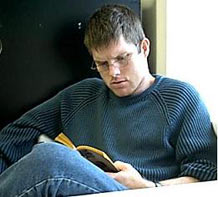 Wednesday, April 08, 2009
Wednesday, April 08, 2009
fine performances.
In February I had the opportunity to hear two great performances in the Hattiesburg, MS area.
The first one, was down the road in Laurel, Mississippi (hometown of the amazing Leontyne Price) at the First-Trinity Presbyterian Church. The concert consisted of the Durufle Requiem and the Gloria by Francis Poulenc. It had been ages since I had listened to the Requiem. I came to the piece early in my undergrad years and had listened to it many times, but I had not heard it in years. My musical ears and tastes have changed since I first heard the work. The performance was wonderful other than a couple late entrances. My wife loved the piece, I still liked it but not with the same fervor I did years ago.
Until I attended this performance I do not recall ever listening to the Gloria by Poulenc. I was pleasantly surprised. I enjoyed it. The performance was excellent. Maryann Kyle was the soprano soloist and she did an amazing job! It was great to hear a local church choir perform these wonderful 20th century works. Not only was First Trinity Presbyterian a beautiful setting with wonderful acoustics for this concert, it was also one of the best concerts I have attended in a while.
The other performance I attended in February was the Integrales New Music Festival at the University of Southern Mississippi. This year, the festival celebrated the Elliott Carter Centenary. There were lectures given by S21 blogger Alan Theisen, Jonathan Bernard, and David Shiff. The concert featured performances by students, faculty and the incomparable Ann Schein.
The concert included a performance of Birthday Flourish. I had never heard the piece, and I am not aware of a recording. It was an exciting performance by USM students. The highlight of the concert came with the Piano Sonata performed by Ann Schein. I have always been a fan of the Piano Sonata, since the first time I listened to the work. I swear I have listened to the piece a thousand times. (Both the Charles Rosen performance and Paul Jacobs.) I was moved to tears. The Piano Sonata is a beast. It always surprises me when I hear it. (Also this was the first live performance of this work I had attended.) There is always something new to find and hear in the piece. (I also highly recommend Ms. Shcein's recording of Carter and Copland.)
I had a couple of friends in attendance that knew very little of Carter's music and were kind of weary to listen to his works. After this concert they were extremely eager to hear more. They were even asking people for their favorite Carter recordings.
posted by Everette Minchew
11:16 AM
Tuesday, June 03, 2008
speech/unspoken
I was recently asked by trombonist Steve Parker to write a short solo piece for trombone. Hear Steve on myspace here. He is a fine trombonist and is working on a commissioning project that explores the link between language and music.
The poem "The Creations of Sound" by Wallace Stevens became the inspiration for the piece.
A couple lines in the poem sparked my imagination:
They do not make the visible a little hard
To see nor, reverberating, eke out the mind
Or peculiar horns, themselves eked out
By the spontaneous particulars of sound.
I composed the piece in eleven small parts that can be played in any order. Each section became a (kind of) variation on the previous one. I liked the idea of writing a piece in mobile form. The piece is roughly two and a half minutes in length, and the title, speech/unspoken, comes from the last lines o the poem:
We say ourselves in syllables that rise
From the floor, rising in speech we do not speak.
On a side note, right before I started composing this piece my computer died. Since I was without my notation software I composed the entire piece using the melody composer on my cell phone. (mobile form....get it!)
Tonight, Steve will be performing speech/unspoken along with other works from this commissioning project at the Steinway Gallery in Anchorage, Alaska.
posted by Everette Minchew
10:00 AM
Thursday, March 27, 2008
Pandora
Recently, I have been listening to a lot of music at work on Pandora.com.
Pandora allows you to create your own radio stations by typing in the name of a song, artist, or composer. Then Pandora will compile a station full of music that shares the same qualities. Pandora is a result of what is called the Music Genome Project.
Today, I have listened to the music of Beck, Amy Winehouse, Birtwistle, Stockhausen and Xenakis. Amazingly, I have managed to listen to the music of the latter three with out being harmed by co-workers.
posted by Everette Minchew
1:08 PM
Thursday, February 28, 2008
Baby Steps
2008 brought something new to Mississippi Public Broadcasting: HDRadio.
I had no idea HDRadio existed. I know more about it now, but I have yet to see an HDRadio on sale in any store.
The new year brought a change in their normal format. More talk shows, news programming, and less music. With an addition of an HD channel they have created a new station of just music programming.
And get this.....they have a show titled Modern Classical airing on Saturdays which I have managed to listen online a couple times. There is a new classical music director and she really seems to be attempting to change the Muzak feel of MPB.
I did start laughing when I listened to the first show and she said, "Every episode of Modern Classical will feature at least one work of a living composer!" That episode started off with Satie's Three Pieces in the Shape of a Pear and I thought "Oh, this is going to be the greatest classical hits of the early 20th century.”
The second episode did surprise me when it included Zippo Songs by Phil Kline. It is a very interesting piece and I was amazed to here it coming from MPB radio.
Here is a list of works I have heard so far on Modern Classical:
Milhaud - La Creation du Monde
Rodrigo - Five Childrens Pieces
Phil Kline - Zippo Songs
Bartok - Violin Rhapsody No. 1
Holst - Mars
Eric Satie – Three Pieces in the Shape of a Pear
Morton Feldman – Rothko Chapel mvts 4 & 5
Prokofiev – Classical Symphony
Webern – Six Pieces for Orchestra op. 6
Bret Dietz - I think it was a piece for two marimbas…sorry.
I haven’t heard any Xenakis yet. Perhaps it’s coming?
Slowly acclimating the listeners to the new stuff I guess.
posted by Everette Minchew
8:21 AM
Sunday, September 16, 2007
composing No Way.
I recently finished my first instrumental work since Hurricane Katrina passed through these parts. It is a short solo work for clarinet titled, No Way.
The initial seed of No Way was planted into my brain earlier this year when Al Theisen and I were talking about writing a new work based off of one of our older pieces where each bar of the new work was a variation off of that bar in the previous piece. Something about that idea just stuck with me. A couple of months later I heard a performance by the USM clarinet professor Gregory Oakes, at the Integrales New Music Festival in March, of a work by Ken Ueno titled, I screamed at the sea until nodes swelled up, then my voice became the resonant noise of the sea for amplified clarinet. That’s when I really started to churn around ideas for a clarinet piece.
Around June, I decided that the bar by bar variation idea using one of my old works could be successful for clarinet. The work I chose was for saxophone, and it was the first work I composed for that instrument. I have a little bit of a soft spot for that piece for that reason. The work was a serialist piece titled, Improvisation, which really wasn’t very improvisatory, but that was the name I branded it with. It has now seen a second life (a successful life, I hope) as a work for solo clarinet.
Since completing No Way, I have had a whirlwind of new ideas, and now I am working on a piece for pierrot ensemble plus percussion titled, Ice Nine. We will see how that goes. It has been fun so far.
posted by Everette Minchew
5:13 PM
Wednesday, July 04, 2007
Independence Day playlist
Elliott Carter - Boston Conerto
Symphony of Three Orchestras
Charles Ives - Three Places in New England
Symphony No. 2
Conlon Nancarrow - Piece No. 2 for small orchestra
Ezra Sims - String Quartet No. 2
posted by Everette Minchew
7:06 AM
Sunday, July 01, 2007
Letter to my wind sextet.

Dear Hydra,
I apologize. I have spoken ill of you for about two years now. I was convinced you were sub-par and ill-conceived. I even asked your dedicatee to forget about you. I had ideas of cutting you up and rearranging you into a new work, but not anymore.
Although your first performance was mediocre at best, I feel that you have yet to reach your prime. I have listened to the premiere performance with a score several times this weekend and I am deeply sorry for my past words. I realize all the charm you posess. I was blaming you for the mistakes of a few performers, and now I regret it. So now I wish you a long life and many great performances. All the best, Everette Minchew
posted by Everette Minchew
1:25 PM
|
|
 Composer Everette Minchew (born 1977) is consistently active in the creation, performance, and promotion of contemporary music. Moderately prolific, his catalogue includes small chamber pieces for violin, piano, various wind instruments, harpsichord and electronic music. Current commissions include a string trio and an opera based on an 11th-century crusades tale.
His earliest musical training came at the age of eleven when he began playing alto saxophone; it wasn?t long until he began his first attempts in composition.
Composer Everette Minchew (born 1977) is consistently active in the creation, performance, and promotion of contemporary music. Moderately prolific, his catalogue includes small chamber pieces for violin, piano, various wind instruments, harpsichord and electronic music. Current commissions include a string trio and an opera based on an 11th-century crusades tale.
His earliest musical training came at the age of eleven when he began playing alto saxophone; it wasn?t long until he began his first attempts in composition.
He received a Bachelor?s Degree in Music History from the University of Southern Mississippi, where he studied saxophone under world-renowned soloist, Lawrence Gwozdz.
Fearing that traditional university training would hinder his development as a progressive composer, he abandoned the idea of formal lessons in favor of an intense private study of modern masterworks.
Minchew's works are characterized by their intense timbral explorations and brutal dissonance. That is not to say, however, that the compositions are devoid of beauty. In the first of the Two Brief Pieces, for example, the harpsichord chimes stringent yet haunting chords evoking a sense of loss.
Other pieces, like the Figment No. 2 "Juggler's Fancy" play upon the kaleidoscopic interaction between timbres and tones. The rapid alternation of pizzicato, arco bowing, and extreme glissandi remind the listener of Xenakis coupled with a Berio Sequenza. Minchew's Invention "Two-Part Contraption" for piano owes much to Ligeti's etudes and boogie-woogie jazz.
His music has been performed around the United States, and he was the featured composer at the 2005 Intégrales New Music Festival in Hattiesburg, Mississippi.
He currently resides in Hattiesburg, Mississippi with his wife, Cheryl.
CONTACT INFORMATION
| |



